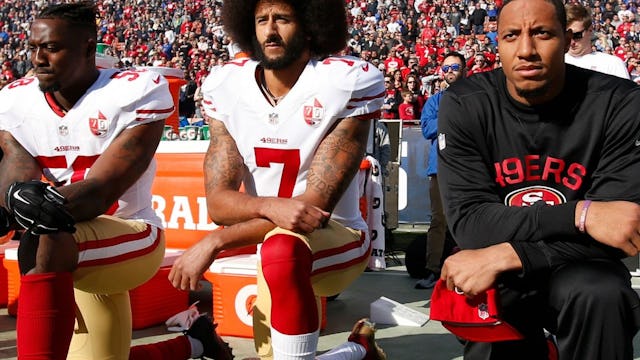As A Military Family, This Is What Colin Kaepernick's Protest Means

It’s hard being a person with multiple identities that people see as mutually exclusive. For example, I am both Black and a woman. As a result of occupying both of those identities, I often find myself torn between two movements and throughout history, there have been many times the support of one meant the denial of another.
Over the last few years, in addition to Blackness and womanhood, I’ve gained a new identity — that of a military spouse. This new classification comes with a ton of complexities because when people think military family, they don’t imagine a young Black man and woman. But there are many of us who represent an “othered” image of military families.
Naturally, when I hear people misrepresent Colin Kaepernick’s protest as a disrespect to our nation’s military, I’m insulted. Those words further a perspective that creates a dichotomy between Blackness and military affiliation. It’s a direct insult to many, like my husband, who occupy both spaces.
For a large part of the week, my husband is seen as a national asset. Like others in uniform, he gets handshakes, thank you’s, and free meals on holidays. His presence is respected, and at least on the surface, he is celebrated. Of course, that is before we get into more in-depth conversations about the overall mental and physical mistreatment the military population experiences.
But when my black husband is dressed in civilian attire, white women hold their purses closer when they see him enter a room. With his usual t-shirt and jeans, he is regarded as one of many black men who is a direct threat to American safety. He’s required to pull out his ID to show his societal value, and that invisible value leaves him at a substantially higher risk of being perceived as a threat and ending up dead.
Thankfully, neither my husband nor I have had any negative run-ins with our local police force. As a matter of fact, I’ve had several direct conversations with our local police chief, and it is clear that he is committed to reducing bias as much as possible.
But most towns don’t have police chiefs like ours. And my husband frequently travels for his job — with travel comes risk.
So when I hear others up in arms, saying that Colin Kaepernick’s acknowledgment of unjust treatment for black and brown individuals is nonsense, I am enraged. My husband puts his physical and mental health at risk daily in sacrifice for this nation. And I’m appalled that someone could say he does not deserve the right to be safe, regardless of whether or not he is in uniform.
For the sake of transparency, I believe Nike acted out of a financial interest in their support for Kaepernick. However, intent never negates the effect, and I understand what they have done in the context of giving a voice to the Black community.
Nike has taken a stand on an issue that is polarizing enough to end friendships, and it’s stock value felt it immediately. As a multi-billion dollar company, they can take that hit though.
We need corporations and public figures like Kaepernick who are willing to take a stand, however, and I’m grateful for any organization willing to fight against social injustice. Until Black Americans, veterans or not, have the ability to exist without fear and disparities in treatment, my husband’s daily sacrifices are in vain.
Those who genuinely care about the American Military need to care about the circumstances that impact ALL service members — especially those who have been othered. There is nothing more sacrificial that putting your life on the line for a nation that has always seen you as “less than”.
Let’s stop pretending like this is about the flag, a love for the military, or a love for America. The backlash is about a fear of social change and progress. Until we secure those qualities, the American service members will never truly respected.
This article was originally published on